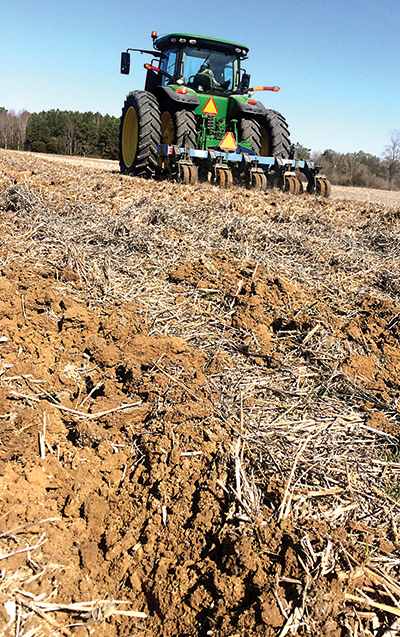by Tom Chillemi –
With spring on the horizon, farmers are preparing soil for the growing season.
On Monday Will Leggett of Fairfield Farms was “ripping” fields in Hartfield. Ripping loosens the soil to a depth of about 12-14 inches while leaving virtually undisturbed all the organic matter on top.

Loosening the deeper “hard pan” soil reduces compaction so the roots can grow deeper, explained Leggett of King and Queen County.
Leggett was operating an auto-steering John Deere tractor that uses a GPS that maps fields to guide it precisely. It’s more accurate and faster, he said.
No till
Ripping the soil retains the valuable organic matter on top and reduces erosion, said E.G. Fleet of Fairfield Farm. Fleet said no-till farming is about 50 years old and is better for the environment because it reduces erosion and takes less work than plowing and discing.
Before no-till, plowing and discing soil was almost a constant process, said Fleet.
Fleet was in high school in the late 1960s when no-till farming was breaking on the scene. There were skeptics that it would not work, but science has proved it’s preferable in many respects.
Fleet explained that ripping helps put heat in the soil by letting sunlight penetrate the soil. The heat will help seeds germinate when they are planted later.
After the soil is ripped, a “turbo tiller” is run over the land to knock down stubble and chop up organic matter.
Hands free
Tractors now have some of the most sophisticated technology available.
The tractor Leggett operates has a large monitor with lines on the screen showing the precise path the tractor will take. It steers accurately with no wasted overlap or missed spots.
Fleet said self-steering tractors can plant rows straighter than a person can. Long rows will vary less than 2 inches.
Fleet did note that the GPS must be calibrated or “rebooted” if a field is started and stopped before the job is completed. This is due to the movement of the earth and the satellites that control the GPS.



